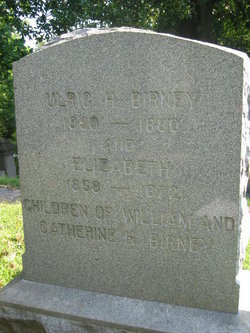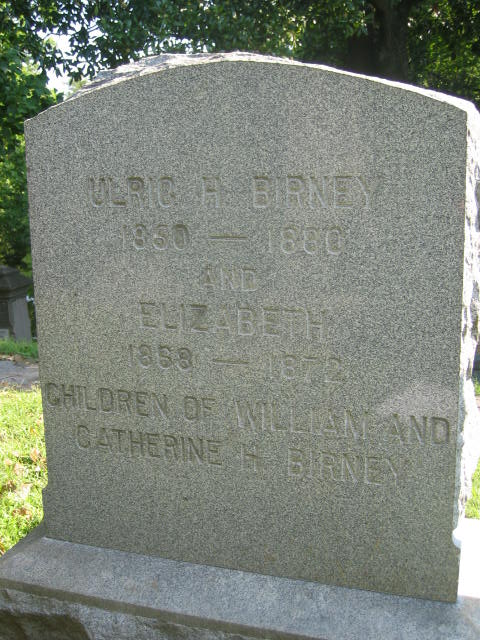The Evening Star
Saturday, November 13, 1880
Died
Birney. Of consumption, November 11, 1880, at Kerrville, Texas, aged thirty, Ulric Hoffman Birney, late of Cleveland, Ohio, eldest son of General William Birney and Catherine H. Birney of Washington City.
In his short manhood, the deceased was distinguished by many evidences of the kind feeling and confidence of the communities in which he lived. His professional practice was large and among the best classes. He was Vice President and Director of the leading club in Cleveland; President of the Young Men’s Republican Association and of the political club of his ward; delegate to the State and County Conventions; alternate to the National Convention of 1876 at Cincinnati and Attorney, elected in 1876, for the city of Cleveland. Though nominated by the Republican Convention and opposed by a Democratic candidate, he received about fifteen hundred votes more than the other Republican candidates – a remarkable tribute to his character.
Struck down suddenly in 1878 by a mortal malady, he sought the mild climate of western Texas. In 1880 the Republicans of Kerr County sent him as their only delegate to the State nominating convention at Austin. He cast his vote for the Blaine delegates, but his feeble health forbade his participation in the campaign.
If he had lived, he was marked for a public career by energy, judgment, intelligence, tact, sympathetic character and freedom from personal animosity. His activity and efficiency in politics made him few or no enemies. He was peculiarly fitted for success in social life. Of tall form and graceful person, with a face of singular purity and beauty of outline and an expressive countenance, he possessed the accomplishments of the ballroom and the parlor. His manners were lively and prepossessing, his temper genial, his wit sparkling, but kindly and his humor gay and even. He was never despondent. Well read, fluent, of retentive memory and facile adaptations to surroundings, his social resources were inexhaustible. He was the soul of many a goodly company. Those who knew him best loved him most. He was never known to utter an impure or profane speech or a bitter sarcasm or an ill natured remark or professionally or otherwise what he did not believe. He never betrayed a confidence even by inadvertence of hint. Nor had he any affectation of small vices or the reality of any bad habit. In all things he was the pure and true gentleman. From infancy he was accustomed to the administrations of the Episcopal Church; but he avoided discussions of technical theology as unprofitable. He lived always under the guidance of religious feeling.
From early childhood till his heart was stilled he was an earnestly loving, thoughtfully attentive son. For his mother especially, his feelings approached a tender adoration. He never wearied in showing his deep devotion to her. From his boyish expeditions he brought back flowers, ferns – any beautiful thing he could – always for her. He avoided what he thought would pain her. His love was all he needed to govern him. In all his childhood the idea of punishment was never associated with him; and he not only never disobeyed his parents, but was thoughtful to forestall their wishes. He comforted his mother in time of sorrow. It was touching to see this bright, cheerful boy, trying by endearing epithets and loving caresses to win her thoughts away from bitter subjects. In the many years of separation, even in the languor of sickness, he was punctual in writing to her; and he always wrote cheerfully. In two years and a half of mortal malady no complaint or fretful repining was uttered by him. With calm and persistent courage, he fought for his life, not that he expected ever to recover full health, but because he could not bear that his mother’s heart should ache.
In his early manhood his affections had found an object; but, being disappointed, he strove to forget. We only know that the deep waters were never again stirred by the descending angel.
In their bereavement his parents have the consolation of knowing that he never caused them a blush of shame and that never – not even for a moment – did nay cloud rest upon the love between him and them. They know, too, that is well with him now.
W.B.
The Evening Star
Saturday, November 13, 1880
Died
Birney. Of consumption, November 11, 1880, at Kerrville, Texas, aged thirty, Ulric Hoffman Birney, late of Cleveland, Ohio, eldest son of General William Birney and Catherine H. Birney of Washington City.
In his short manhood, the deceased was distinguished by many evidences of the kind feeling and confidence of the communities in which he lived. His professional practice was large and among the best classes. He was Vice President and Director of the leading club in Cleveland; President of the Young Men’s Republican Association and of the political club of his ward; delegate to the State and County Conventions; alternate to the National Convention of 1876 at Cincinnati and Attorney, elected in 1876, for the city of Cleveland. Though nominated by the Republican Convention and opposed by a Democratic candidate, he received about fifteen hundred votes more than the other Republican candidates – a remarkable tribute to his character.
Struck down suddenly in 1878 by a mortal malady, he sought the mild climate of western Texas. In 1880 the Republicans of Kerr County sent him as their only delegate to the State nominating convention at Austin. He cast his vote for the Blaine delegates, but his feeble health forbade his participation in the campaign.
If he had lived, he was marked for a public career by energy, judgment, intelligence, tact, sympathetic character and freedom from personal animosity. His activity and efficiency in politics made him few or no enemies. He was peculiarly fitted for success in social life. Of tall form and graceful person, with a face of singular purity and beauty of outline and an expressive countenance, he possessed the accomplishments of the ballroom and the parlor. His manners were lively and prepossessing, his temper genial, his wit sparkling, but kindly and his humor gay and even. He was never despondent. Well read, fluent, of retentive memory and facile adaptations to surroundings, his social resources were inexhaustible. He was the soul of many a goodly company. Those who knew him best loved him most. He was never known to utter an impure or profane speech or a bitter sarcasm or an ill natured remark or professionally or otherwise what he did not believe. He never betrayed a confidence even by inadvertence of hint. Nor had he any affectation of small vices or the reality of any bad habit. In all things he was the pure and true gentleman. From infancy he was accustomed to the administrations of the Episcopal Church; but he avoided discussions of technical theology as unprofitable. He lived always under the guidance of religious feeling.
From early childhood till his heart was stilled he was an earnestly loving, thoughtfully attentive son. For his mother especially, his feelings approached a tender adoration. He never wearied in showing his deep devotion to her. From his boyish expeditions he brought back flowers, ferns – any beautiful thing he could – always for her. He avoided what he thought would pain her. His love was all he needed to govern him. In all his childhood the idea of punishment was never associated with him; and he not only never disobeyed his parents, but was thoughtful to forestall their wishes. He comforted his mother in time of sorrow. It was touching to see this bright, cheerful boy, trying by endearing epithets and loving caresses to win her thoughts away from bitter subjects. In the many years of separation, even in the languor of sickness, he was punctual in writing to her; and he always wrote cheerfully. In two years and a half of mortal malady no complaint or fretful repining was uttered by him. With calm and persistent courage, he fought for his life, not that he expected ever to recover full health, but because he could not bear that his mother’s heart should ache.
In his early manhood his affections had found an object; but, being disappointed, he strove to forget. We only know that the deep waters were never again stirred by the descending angel.
In their bereavement his parents have the consolation of knowing that he never caused them a blush of shame and that never – not even for a moment – did nay cloud rest upon the love between him and them. They know, too, that is well with him now.
W.B.
Family Members
Advertisement
Explore more
Sponsored by Ancestry
Advertisement











